Ramadan traditions are always best manifested in Egypt, the most populous Arab country where the Islamic month is distinguished at all levels and assumes a celebratory nature that adds to its spiritual importance.
Most of the Ramadan social and culinary habits that can be found in other Arab countries can find their roots in Egypt.
Despite Egypt’s religious diversity, with the Arab country boasting a sizeable Christian community, the way Ramadan is celebrated in it can be found nowhere else in the world.
Egyptians differ in how they prepare for the holy month. Their preparations for the month start weeks before it begins.
Weeks before the beginning of Ramadan, colourful Ramadan treats, including the dried nuts, dates and fruits of all types, fill the markets and adorn the streets, even before Ramadan decorations and lanterns make their presence felt in these streets.
Here is a survey of centuries-old traditions that are associated with Ramadan in most North African countries and around the world, but ones that have originated in Egypt.
Pre-dawn drummers
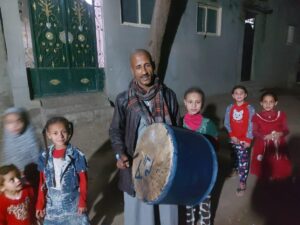
The drummers or Musaharatis, as Egyptians call them, wake Muslims up to get their pre-dawn meals (suhour) in preparation for fasting on the new day.
Each morning during the Islamic holy month of Ramadan, an hour or two before dawn, drummers walk slowly in the streets with small drums, hammering out a repetitive beat to wake people up to have their suhour.
Mesaharatis wander alleyways with their drums and sing traditional songs. They sometimes start their work hours before dawn, which gives children playing on the streets with their lanterns the chance to see them and interact with their songs and drum beats.
Some children also prefer to stay up to witness the Musaharatis roaming the streets with their drums.
“My children refuse to sleep every now before they see the Musaharati under the house,” schoolteacher Ahmed Ali told The Gazette.
Sorry to say, this profession is on its way out, with few in the new generation preferring to do the seasonal Musaharati job.
This leaves a bitter taste in the mouths of people like Ali who grew up associating this drummer with everything beautiful in Ramadan.
“This job is an indispensible feature of this Islamic month,” Ali said.
The Musaharati job is believed to date back to the Ottoman era when people did not have alarm clocks to wake them up for Suhour.
Drummers would walk through the streets, beating their drums and singing phrases they inherited from their fathers and grandfathers, including “Wake up, sleepers, there is only one God; it is time for Suhour fasting people”.
As the month draws to a conclusion, Musaharatis pass by the homes of the people they used to wake up during the month, as if they are paying them farewell.
People usually throw month and gifts from their balconies and windows to the Musaharati in recognition for the efforts he did all throughout the month.
Almost all the Musaharatis present in Egypt are males.
Ramadan lanterns
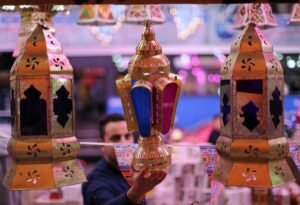
The lanterns are the most popular decorative pieces of Ramadan.
Made from a wide range of materials, including metal and tinted glass, the lanterns come in different shapes and sizes.
Egyptian Muslims decorate streets, homes, and balconies with lights, decorations, and huge lanterns.
The Ramadan lanterns are the holy month’s main symbol.
“You will never visit a home in Egypt or pass by a neighbourhood without finding beautiful lanterns, lighting up the place,” Ahmed Reda, a student at the College of Commerce, Cairo University, said.
Reda’s father used to buy him the Ramadan lantern every year, being a sign of the holy month.
Lanterns are no longer used as a source of light. Nevertheless, many families and businesses across the Muslim world continue to use them as decorations.
Cannon
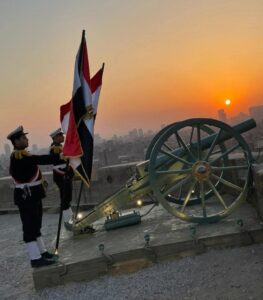
The breakfast cannon has always been associated with happy moments for millions of Egyptians.
The Ramadan cannon is fired at sunset every day during the holy month to announce the breaking of the fast.
The Ministry of Tourism and Antiquities announced that the Ramadan cannon would be fired again from the Police Museum in the Cairo Citadel, after a pause of almost 30 years.
The reoperation of the cannon came hard on the heels of a major restoration in it.
Many stories and myths surround the Ramadan cannon. However, most of these stories confirm that it the cannon had originated in Cairo, especially in the Cairo Citadel.
According to one of the stories, the cannon dates back to the reign of the Mamluk Sultan, Khaskadam, when he wanted to try a new cannon and ended up test firing it at sunset on the first day of Ramadan in 1467 CE.
Meanwhile, some people believe that it began in the 10th century during the Fatimid caliphate.
At sunset, when it is time for Muslims to break their fast, the sound of a boom reverberates throughout the silent streets of Cairo. It is the sound of the Ramadan cannon shooting and signaling sunset time.
For centuries, the cannon had been the only method for people to know the time to break their fast.
Another story tells of some soldiers during the reign of Khedive Ismail who were testing one of the cannons, and a shell was launched from it that rang in the sky of Cairo also at the time of the breakfast in Ramadan.
Street decorations
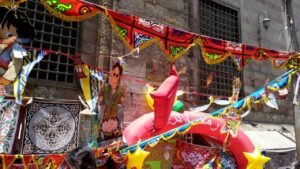
Decorating the streets is also one of the most important traditions for Egyptians in Ramadan.
Teenagers and children tend to get together with their parents and friends to decorate their streets with Ramadan decorations.
These ropes of colourful bands go back and forth between balconies, with lanterns and coloured lamps, giving the streets a vibe of joy that only Egyptians can relate to.
Famous Ramadan treats
There are many traditional dishes that characterize Ramadan staples in each home.
These staples include mahshi (rice and herbs stuffed veggies), and bechamel pasta among many others.
There are also traditional beverages that Egyptians cannot live without in Ramadan, such as apricot juice, hibiscus tea, and tamarind.
Soap operas
Egyptians watch TV series that are made for and broadcast especially during Ramadan. This is a rather recent tradition which is called Mosalsalat in Egypt, Egyptian or Arab-made series that people watch during Ramadan.
Almost all good, memorable series have been shown for the first time in Ramadan as it is a season of high viewing, especially after iftar since most people are staying at home.
Therefore, almost all television directors and producers jam their work throughout the 30 days of Ramadan.
Taraweeh prayers

After the nighttime prayers (Isha), Egyptians go to mosques to perform Taraweeh prayers during the holy month.
People of all age groups, including men, women and children, attend these prayers.
Taraweeh prayers have been banned in Egypt and some other Muslim nations in the past two years, in a bid to curb the spread of Covid-19.
Taraweeh is a word that means in Arabic to rest and relax. These special prayers involve reading long portions of the Holy Qur’an, as well as performing many rakahs. Taraweeh prayers are considered optional for Muslims. However, it is believed that the reward for them is great.
Charity banquets
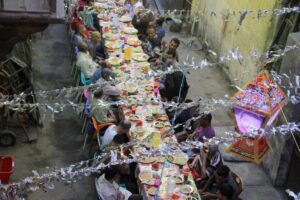
During Ramadan, Muslims around the world usually hold public banquets known in streets or near mosques to offer free fast-breaking meals for the needy and passers-by.
The tradition, which started in Egypt around 11 centuries ago and is currently observed on a large scale by charity associations, civil society organisations, and almsgiving committees at mosques countrywide, inspires observant Muslims to be charitable during the holy month.
Ramadan nights
Most Egyptians do not go to bed until sohour and entertain themselves during Ramadan nights in various ways. Ramadan tents are the most famous places where people enjoy nightlife during Ramadan nights.
Restaurants and hotels have harsh competition with each other as they serve iftar and sohour meals with traditional Arabic music, where families and friends can enjoy eating until dawn.
Furthermore, during the holy month of Ramadan, there are different football tournaments held across the nation.
Every club, youth centre, or football court has a football tournament throughout the thirty days of Ramadan.



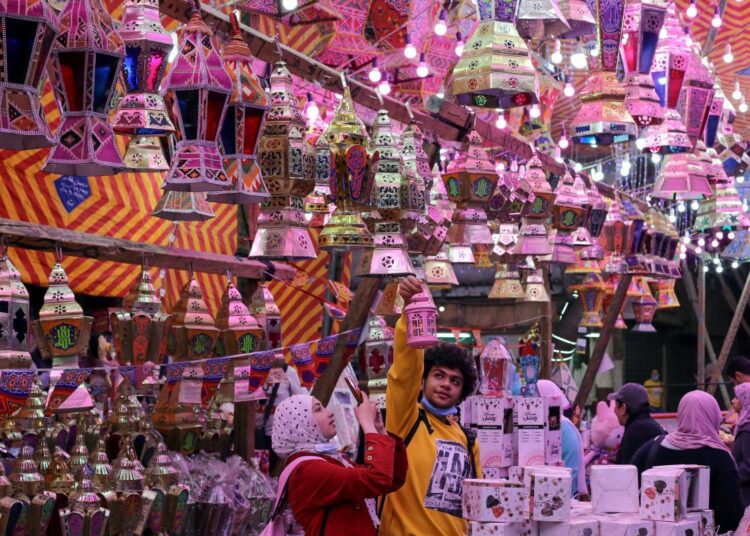


Discussion about this post